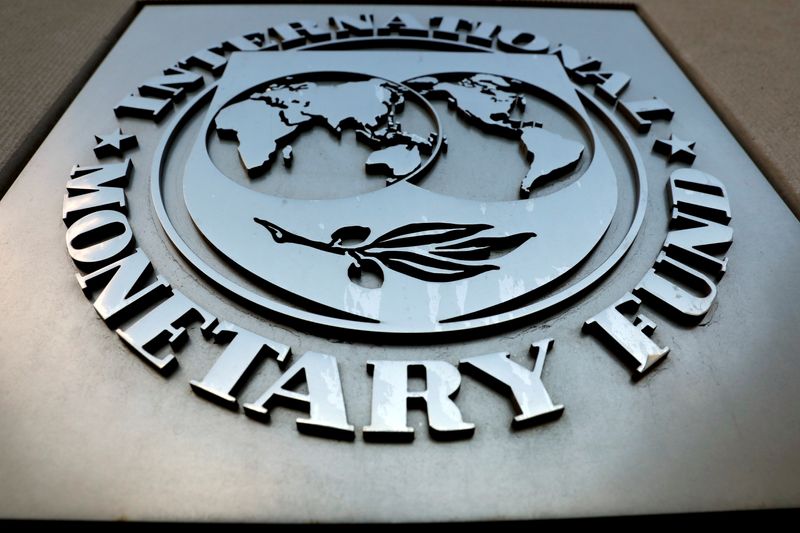IMF visit in focus after El Salvador bond payment

FILE PHOTO: The International Monetary Fund (IMF) logo is seen outside the headquarters building in Washington, U.S., September 4, 2018. REUTERS/Yuri Gripas/File Photo
JPM
0.00%
Add to/Remove from Watchlist
Add to Watchlist
Add Position
Position added successfully to:
Please name your holdings portfolio
Type:
BUY
SELL
Date:
Amount:
Price
Point Value:
Leverage:
1:1
1:10
1:25
1:50
1:100
1:200
1:400
1:500
1:1000
Commission:
Create New Watchlist
Create
Create a new holdings portfolio
Add
Create
+ Add another position
Close
By Rodrigo Campos
NEW YORK (Reuters) — El Salvador cleared a $600 million bond payment hurdle this week but lingering concerns over its financing sources and fiscal policy will be in focus as the country prepares for an annual visit from the International Monetary Fund.
Investors will watch for any sign of closer ties between President Nayib Bukele and the IMF during its visit to San Salvador starting on Jan. 30. The so-called «article IV» visit will assess the country’s economic and financial developments and policies and has been sharply critical in the past. El Salvador’s move to make bitcoin legal tender in September 2021 effectively closed the doors to IMF financing.
The tussle with the IMF was part of the reason Salvadoran bond prices tumbled back then and were depressed until recently, to the point where this week’s payment was put in doubt.
The presidency’s press office told Reuters late on Monday the payment to totaled over $625 million, including interest.
Two rounds of bond repurchases focused on this week’s maturity and a bond maturing in 2025 had left just over $600 million outstanding in the 2023 bond and under $350 million on the 2025 issue.
Salvadoran debt has been among the best performing in emerging markets over the past months, partly due to the rally in the price of these two bonds. The 2023 last traded at less than a cent below par, from a 2022 low of 64 cents in July. Government debt spreads fell from near 3,500 basis points in July to 1,454 on Tuesday.
Following the payment, investor focus turns to a tighter fiscal discipline as the Bukele government enters a re-election campaign ahead of February 2024 elections, as well as to other sources of short-term financing.
«The IMF’s announcement of an Article IV visit to El Salvador is positive in the sense that it shows both parties continue to engage,» said Todd Martinez, who is responsible for analysis and ratings of sovereign credits in Latin America for Fitch.
«But it’s too hard to say if it signals any progress regarding the key sticking points for a potential program: bitcoin, governance issues, and fiscal adjustment.»
Fitch in September cut its long-term rating on El Salvador to ‘CC’ which means a default of some kind «appears probable.»
El Salvador has been in investors’ crosshairs since 2021, when the Bukele administration and its majority in Congress fired the judges on the constitutional panel of the Supreme Court, among the most senior jurists in the country, as well as the then-attorney general, a move criticized by Washington.
The country’s bonds maturing in 2029 through 2052 all ticked lower in price on Tuesday and traded between 47.5 cents and 54 cents on the dollar. At current market prices, Salvadoran bonds are yielding between 17% and 23%, effectively cutting the Central American country out of debt markets.
«El Salvador’s financial position remains fragile, as shown in our estimate that financing needs and sources for the year imply a gap of around $600 million,» said Steven Palacio, economist at JPMorgan (NYSE:JPM) in a client note.
He said, however, their assumptions are «modest, in terms of multilateral financing,» and more cash could flow from the regional lenders like the Central American Bank for Economic Integration (CABEI), which committed $350 million for El Salvador recently.
For some investors, the double-digit yields are hard to ignore.
«We continue to believe the fundamentals of El Salvador are much better than what is reflected in current bond prices,» said Aaron Stern, managing partner & CIO of Converium Capital in Montreal.
«The country has a small and manageable deficit with a good history of fiscal controls, the economy is growing at a healthy pace, has access to funding from regional multilaterals and has no external bond maturities until January 2025,» he added, noting that the current yields «should attract considerable attention.»




